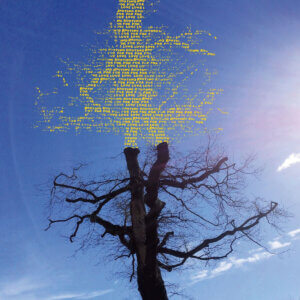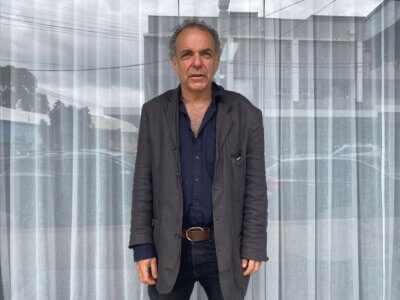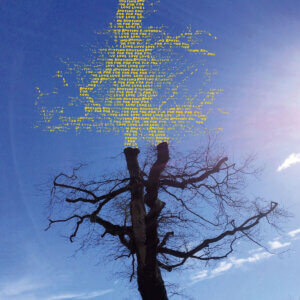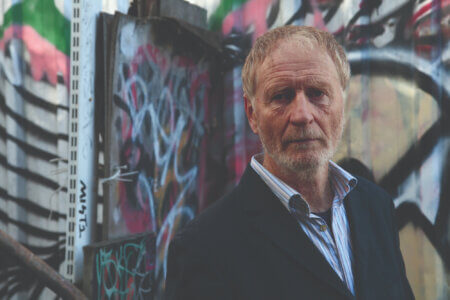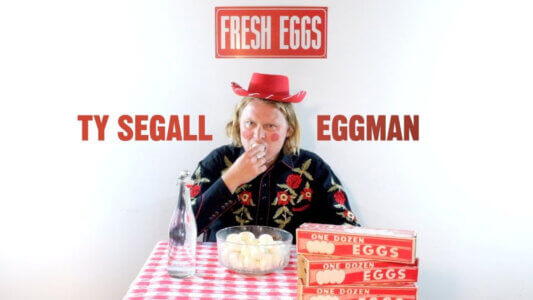Our interview with Laetitia Sadier

Laetitia Sadier has just released her mesmerizing album Something Shines, and will be touring Europe and the UK in November and December; perfect music to accompany the late autumn mists and fogs. Autumn has always been a fertile time for revolutionary spirit as well, from Guy Fawkes to 1989 to the Occupy movements, with significant waypoints in between. The former member of Stereolab isn’t coming over here at the moment, and Northern Transmissions wanted to know more about the ideas expressed in the album and the artistic spirit that infuses the music. Alice Severin sent a message in a bottle and it came back on a wave, filled with sparks of inspiration and sharp, observant comments on the political and creative landscape of our time. Sadier shares her thoughts here.
Northern Transmissions: How did the album come to be?
Laetitia Sadier: Something Shines was made over a long period of time compared to the other two, which were made very quickly and in a state of urgency. It has a more experimental quality. I wanted it to mature, to let time do its thing so to give the music time to give off its own elements of fermentation, which is a process of transformation I find fascinating. So it came to be in a slow process.
NT: Are you inspired at all by modern classical musicians, like Satie?
LS: I went to the opera for the 1st time this year and saw Dialogues de Carmelites, by Francis Poulenc, and I was extremely impressed by the music. Composers like Satie or Ravel I don’t listen to as often as I’d like, but I know that they stood out in their time as turning the rigid rules of art and music in particular in a radical way, creating something in the process, which might have been scandalous at the time, but is considered very elegant and beautiful music today. They were pioneers and had to move forward and in that respect I find these composers very inspiring.
NT: How do you move from your ideas to create the final version of the songs?
LS: Well I sit down and write, or allow, when it’s ready, a song or two to jump on me.
For this album I wanted to go back and forth between a riveting moment to another that would shake the listener vigorously. I did apply the idea to some degree, and some other songs decided by themselves to do something different, such as Oscuridad for example, where the music is meant to be and feel as disgusting as the lyrics…
NT: In The Scene of the Lie, you talk about being made to forget what can be known/what is knowable. Is it important to remind people that they have imaginations, ideas that could come from them, if they were not being convinced that there is only one way to look at things?
LS: The Scene of the Lie relates the fact that we live in a system – and like any system its particularity is to be closed – that was described by Guy Debord as La Société Du Spectacle under which we are submitted to constant propaganda, carried out by the media who are absolutely pervasive. The message is always the same, to forget where we come from, to forget how we got to where we are, historically speaking, and to only pay attention to the inane and vapid flat present that is served to us through the same media. The more spectacular the news, the better really for us to be fleetingly shocked or flattered and forget further, and of course there is never any in depth explanation of how we got to this situation. Complexity is banned. Noam Chomsky talked a lot about all this too, the extent to which we are manipulated, but not just in the media, also the way we lay out our cities, build our houses and blocks of flats, shopping malls, all this impacts the way we think and act, conditions our behaviors to a big degree. The question is where do we find the freethinking human, the free will of mankind in all of this?
NT: You’ve talked about the pleasure and responsibility of working solo. Does it feel like a challenge?
LS: Of course it is a big challenge. The main one has been to find my own way, my own voice after being the voice of Stereolab for so long. I threw my whole self and my whole life into creating and fronting this band… Now I feel it’s like a reproach that what I do solo isn’t 7000 miles away from the sound and spirit of the band. So that’s been a challenge, redefining my self and musical purpose.
I have a very enjoyable and enriching time and experience working the way I do now, with times that are very hard too, but they are indissociable part of the package that I chose. I realize through this experience that responsibility is a sure way to grow and one should always chose it over handing over one’s fate to some boss or religion or guru. I do believe we are born to learn from our experiences and those are richer when you take responsibility for every move you make, word you say, decision you make.
 NT: Looking at the world as it is now, compared to when you first began making music, do you think it is more difficult to be an artist with a unique vision?
NT: Looking at the world as it is now, compared to when you first began making music, do you think it is more difficult to be an artist with a unique vision?
LS: I don’t know if it’s harder, it seems that less and less strive for that. We came about in the late 80’s early 90’s, inspired by the after punk movement which was characterized by the idea of DIY, do it yourself, don’t wait till someone gives you the diploma for what you want to do; go out and do it. Fight the Man – with big yankee dollars. Fight the system by being creative, by being yourself, by being unique, by being intelligent. That was the sort of underlying reasoning and environment we flourished in – there was a good dose of crap going on too at the time, but our scene was very supportive. What I think is happening today is that the system has refined its message and ways to instill its ideology in people to such sophisticated degree, that a lot of people indeed think that this is the way, there is no alternative, “I’m just here to make money, at any cost”, “I’m quite happy with my iPhone” and my illusions of being a princess or a prince.
NT: You moved from France to the UK long ago. Do you still live there and what do you think is the appeal of living in another country?
LS: It’s funny, I am on the train to Paris as I write this, and as I looked out the window onto France, I had this thought – “I really don’t miss my country”…Oh what’s wrong with me? Such a beautiful country…I can’t stand it. Maybe a part of myself that I can’t stand. Or maybe I was just born in the wrong country, I miscalculated my landing! A big advantage of living in the UK is that whatever is going on there that I don’t like doesn’t affect me so much. So everything is more romantic and new.
In truth, I do have a passion for London, as far as big cities go I believe it is one of the best; it is high on energy, it’s dynamic, lots going on, and it has big and small parks everywhere and it is not unusual to have a garden, so lots of nature – the Brits are excellent gardeners.
NT: Watching videos of you performing, there is such a calm and certainty about your presence. Do you feel that way on stage, and what do think when you watch performers?
LS: I try to get in the flow that will take me over and over me when I’m on stage, because it is the best place to be if I’m performing. What I think when I watch a performer depends on who is performing! I saw Mary J. Blige on TV last night, and was amazed by the amount of control AND passion that went into her performance. I like when people on stage are determined, when they are completely into what they are doing. Marianne Faithfull was also on the same program, and she has also complete passion inhabiting her and giving her the energy to sing. That’s fascinating and beautiful.
I like when performers let go of themselves and something else shines.
NT: In Oscuridad, you ask a very pertinent question – “Is it in the interest of the rich to eradicate poverty?” It seems such an obvious question, but it isn’t one that is asked.
LS: That is precisely why I asked it in a song. There are lots of obvious things that go unspoken about and I am at a point where I am losing my cool over those questions systematically being eschewed. And people are implicit, they are, we are, voluntarily serving the very system that exploits us.
NT: With the title Something Shines, and songs like the last one on the album, Life Is Winning, do you think there is a search for something good amidst all the bleakness and insanity that we are asked to accept?
LS: Yes there is ALWAYS hope. You have heard of Pandora’s Box, like we all have and all the bad things and traps that are found in there. Well the little known fact about this box is what is to be found at the bottom of it: yes, it’s Hope!
NT: Finally, five albums that inspire you.
In the Morning We’ll Meet, by Giorgio Tuma
Who’s Your New Professor?, by Sam Prekop
A Space Without Corner, by SuperBravo
Viva! La Woman, by Cibo Matto
23 Great Recordings, by Jonathan Richman and the Modern Lovers
Latest Reviews
Tracks
Advertisement
Looking for something new to listen to?
Sign up to our all-new newsletter for top-notch reviews, news, videos and playlists.





